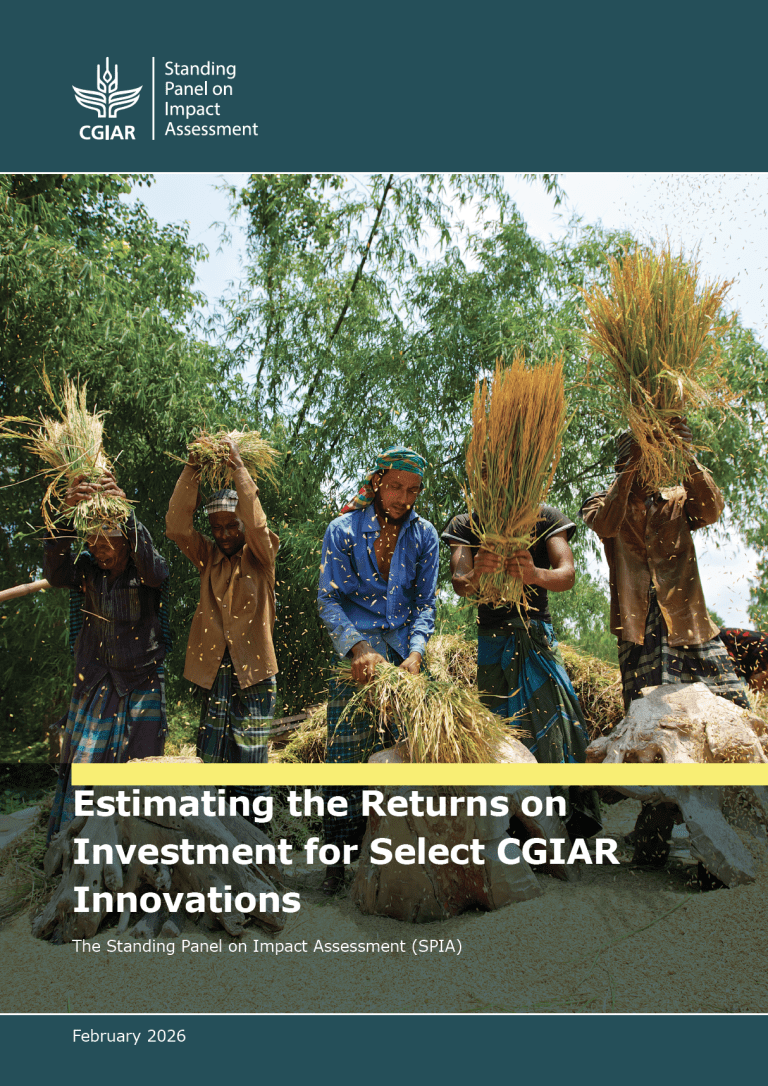Previously threatened by widespread famine in the 1970s due to its fast-growing population and low per capita food grain availability, Bangladesh has since achieved self-sufficiency in its domestic food needs. In the past decades, the country experienced a remarkable growth in rice yields, increasing from 1 ton per hectare in the early 1970s to 3 tons per hectare in 2013 (Gautam and Faruqee, 2016).
This significant increase in agricultural productivity can be attributed to major technological change in the country. SPIA is working on Bangladesh because it is believed that CGIAR was one of the key contributors to this progress, through a combination of research, technological innovation, and policy advocacy. CGIAR centers’ research efforts spanned a broad range including varietal development, and in the promotion of irrigation, mechanization, sustainable intensification, collaborative management of natural resources, and market-based solutions for the provision of agricultural services. To foster the creation of an appropriate enabling environment for these changes, much focus was also given to support the Government of Bangladesh in enacting a number of policy reforms.
With a view to fulfilling its mandate of generating evidence on the reach and impact of the CGIAR system, the Standing Panel on Impact Assessment (SPIA) is conducting comprehensive studies in countries where the CGIAR centers have extensive research portfolios. Bangladesh was identified as a priority country for this assessment, not only because of CGIAR's significant involvement in the country's Green Revolution, but also due to ongoing efforts by various centers to help Bangladesh address contemporary challenges such as achieving nutrition security and fostering inclusive and sustainable development in the face of climate change, environmental degradation, and land scarcity.
In order to better understand the impact of CGIAR-related work on the agricultural sector in Bangladesh, SPIA conducted an extensive stocktaking exercise aimed at identifying the innovations most likely to have reached a large number of rural people. To narrow down the scope of SPIA’s Bangladesh study from the initial universe of activities that took place in the country, a consultation meeting was organized, bringing together CGIAR scientists, academia members, NARS (National Agricultural Research System), and policy-makers. This two-day event, which occurred on the 10th and 11th of July, offered the ideal setting for an in-depth discussion on the various aspects of the CGIAR presence in the nation.
|
|
|
From left to right: Dr. Sattal Mandal, Ms. Wahida Akhter, Prof. Karen Macours, Mr. S. M. Rezaul Karim MP (Minister of Fisheries and Livestock), Ms. Temina Lalani-Shariff, Dr Mohammad Bokhtiar, and Dr Mohammad Abdur Razzaque (Minister of Agriculture) |
Recognizing the pivotal role that the collaboration with governmental and academic partners has played throughout all the years of CGIAR activities in Bangladesh, this gathering aimed to reflect on the past two decades of CGIAR's work in the country, and to pin down which technologies resulting from these joint efforts are suitable for future studies on adoption. To this end, the first day of the event welcomed many policy-makers, among which the Honorable Minister of Agriculture, Dr. Muhammad Abdur Razzaque, and the Honorable Minister of Fisheries and Livestock, Mr. S. M. Rezaul Karim MP. They shared their Ministries priorities for sustainable development in Bangladesh, and detailed how the longstanding engagement with the CGIAR has been contributing to the achievement of these goals.
|
|
|
From left to right: Prof. Karen Macours and Dr. Sattar Mandal |
During the afternoon session, CGIAR Scientists participated in a panel discussion to highlight the most important components of their center’s research portfolio. Representatives of the NARS, and of leading academic institutions in the country were also present to offer their perspective on the specific innovations that were put forward. The Consultation Meeting was facilitated by the illustrious Bangladeshi academic, Dr. M. A. Sattar Mandal, who offered attendees the opportunity to look at CGIAR contributions over the years through the lens of his deep and insightful knowledge on agrarian change processes in Bangladesh.
During the second and final day of the workshop, participants engaged in more hands-on activities, focusing on prioritizing CGIAR contributions that warrant measurement and discussed possible strategies for incorporating these aspects into systematic data collection efforts in the country. As a result of these complementary stocktaking and consultation endeavors, SPIA successfully identified a specific set of CGIAR-related innovations that require additional data on their scale and adoption.
Currently, the SPIA team is actively engaged in bilateral discussions with potential data collection partners. The main goal is to find the best approach for integrating SPIA’s measurement requirements into existing nationally-representative surveys. This integration would not only contribute to SPIA’s impact assessment mandate, but also to generate positive spillover effects for the academic community through the creation of a public instrument to track the adoption of agricultural technologies in Bangladesh, an idea that found widespread support throughout the workshop.




